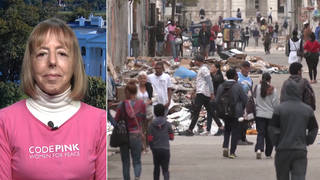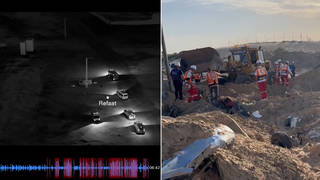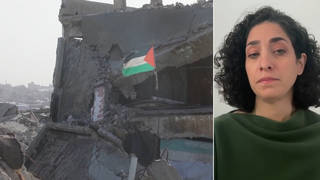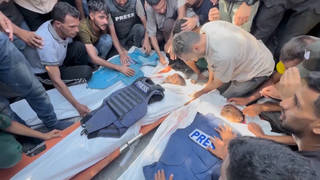
Palestinians are still being systematically starved in Gaza even as ceasefire talks are underway this week. “It is a choice that Israel has, whether to feed the people or whether to starve them,” says Alex de Waal, executive director of the World Peace Foundation at Tufts University. “The children who have been through this will suffer physical and cognitive harm for the rest of their lives, and there is an obligation on those who perpetrated the crime, and indeed on the rest of us, to give them the support.”
Transcript
NERMEEN SHAIKH: This is Democracy Now!, democracynow.org, The War and Peace Report. I’m Nermeen Shaikh in New York, with Amy Goodman in San Francisco.
AMY GOODMAN: Negotiations are set to begin in Egypt today, after Hamas and Israel agreed to parts of President Trump’s 20-point plan for a Gaza ceasefire. On Friday, Trump wrote on Truth Social, quote, “Israel must immediately stop the bombing of Gaza, so that we can get the hostages out safely and quickly.” Trump made the comment after Hamas issued a response to his plan but did not accept all the conditions.
The deal calls for a swap of all remaining hostages in Gaza for Palestinians imprisoned in Israel, as well as an eventual Israeli military withdrawal from Gaza, and outlines a transitional governance structure. But major questions remain over what both Israel and Hamas will agree to.
NERMEEN SHAIKH: This comes as Israeli forces have continued indiscriminate bombardments across Gaza. Dozens of Palestinians were killed in Israeli airstrikes on Saturday. This is Shadi Mansour burying the body of his son Amir in Gaza City.
SHADI MANSOUR: [translated] Last night, a whole residential compound in al-Tuffah neighborhood was subjected to a barbaric Israeli strike amid news of a possible deal and the agreement of Palestinian factions to the plan by the United States president, Donald Trump, to stop the war and free the Israeli hostages. As you can see, the target of the Israeli army are not members of the resistance or, as it claims, armed people. It is children. This is Amir, my son. I had him after 40 years. Is he a member of the resistance? Is he a fighter? All the targets of the Israeli army are children. In this area, in this residential compound, no less than 17 people were martyred, including, as you see, under the rubble.
NERMEEN SHAIKH: Meanwhile, on Sunday, Israeli forces killed at least 24 Palestinians. Another seven were killed so far today, including three people seeking food.
For more, we begin our coverage in Gaza with Eyad Amawi, representative of the Gaza Relief Committee and a coordinator for local NGOs based in Deir al-Balah in central Gaza.
Welcome back to the show, Eyad. There is a long delay, audio delay, between Gaza and here, but it was very important for us to hear directly from you. So, just tell us what is the situation on the ground. And what do you think of these negotiations that are beginning today on Trump’s 20-point plan?
EYAD AMAWI: Yeah, thank you so much for hosting me again. The situation looks like stabilizing the current —
NERMEEN SHAIKH: I’m afraid it seems that we have lost audio with Eyad. We’ll just go to break now, and hopefully the audio will be fixed and we will return to him. This is Democracy Now!, democracynow.org.
[break]
NERMEEN SHAIKH: This is Democracy Now!, democracynow.org, The War and Peace Report. I’m Nermeen Shaikh in New York, with Amy Goodman in San Francisco. We were unable to reach Eyad Amawi, representative of the Gaza Relief Committee, who we were speaking to earlier. We sadly lost audio with him. We’ll keep trying to reach him, and if we do, we’ll go to him. Amy?
AMY GOODMAN: We’ll turn now to conditions on the ground in Gaza as ceasefire talks are underway this week. Among the points in President Trump’s peace plan revealed last week is that humanitarian aid must enter Gaza as soon as Hamas accepts the proposal. But our next guest argues aid should not be conditional on a ceasefire.
NERMEEN SHAIKH: We go now to Alex de Waal, executive director of the World Peace Foundation at Tufts University and the author of the book Mass Starvation: The History and Future of Famine. His recent piece for Foreign Affairs is headlined “The Return of the Starvation Weapon: The Collapse of Global Norms Fueling the Catastrophes in Gaza and Sudan.”
So, Alex, we’ll begin with the situation in Gaza on the ground. If you could explain the argument that you make about how aid should not be contingent on an agreement to a ceasefire?
ALEX DE WAAL: So, famine is one of the simplest problems in the world to resolve. Historically, famines have been caused by all sorts of things, like drought, like — and crop failure, economic failures, etc. But all current famines, every famine, every episode of mass starvation in the last 30 years or so, has been man-made, the result of political or military action. And a set of norms were adopted by the international community, culminating in a Security Council resolution that was voted for, was partly designed by the first Trump administration seven years ago, that said, among other things, that starvation of civilians may be a war crime, that humanitarian aid should be provided to those who are facing starvation, no matter what, and the U.N. Security Council should be notified and should act whenever this happens, or whenever such an eventuality threatens.
And Israel has repeatedly shown, whenever it is put under serious pressure, that it can respond. It can solve the starvation crisis, or at least ameliorate starvation, in Gaza in a matter of days, should it want to do so. It is a choice that Israel has, whether to feed the people or whether to starve them. And there is, under international law and under actual practice, absolutely no reason why humanitarian aid should wait until there is a ceasefire and end to the fighting.
AMY GOODMAN: Let me ask you, Alex, before we go to Sudan: In the event that a ceasefire is reached, what exactly needs to happen? What would restorative justice entail? What does Israel and the rest of the world owe to the survivors of starvation and to the families of those who starved to death in Gaza?
ALEX DE WAAL: So, starvation is both a biological phenomenon and a social phenomenon. So, the biological impact on children of suffering starvation, when they survive, is lifelong. The children who have been through this will suffer physical and cognitive harm for the rest of their lives, and there is an obligation on those who perpetrated the crime, and indeed on the rest of us, to give them the support. It is also a social experience. The humiliation, the tearing apart of those social ties is as profound as that physical damage.
And so, there is also an obligation on Israel and on the rest of us. And I’m actually publishing today an article in Jewish Currents on this very topic, on the obligation on the Jewish community, as a whole, globally, to repair that social damage that is done to the victims of this, this planned starvation.











Media Options